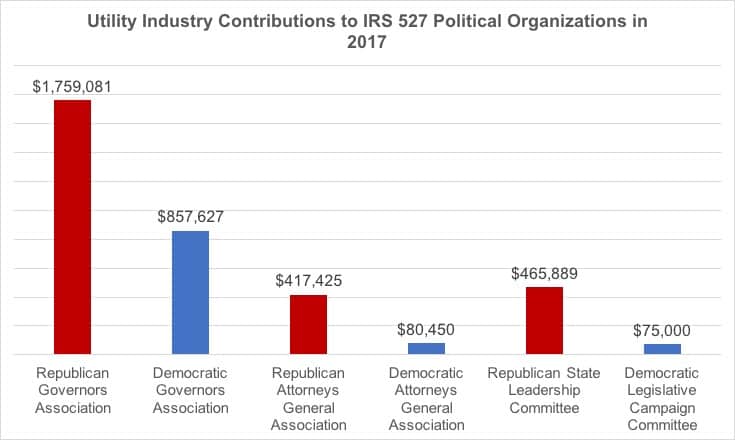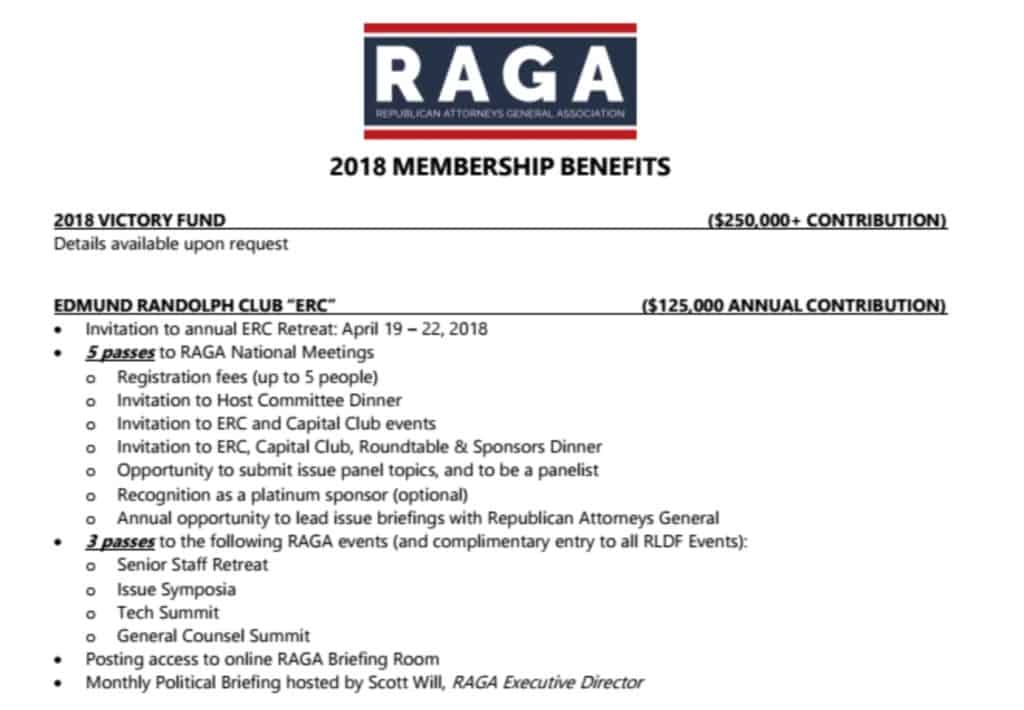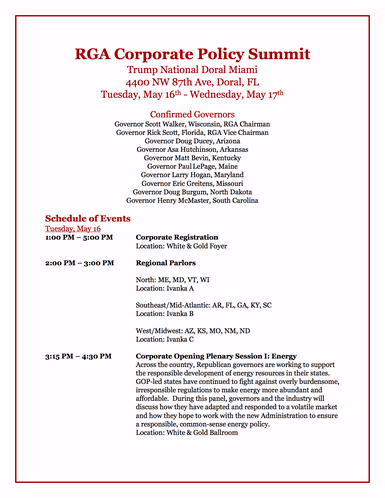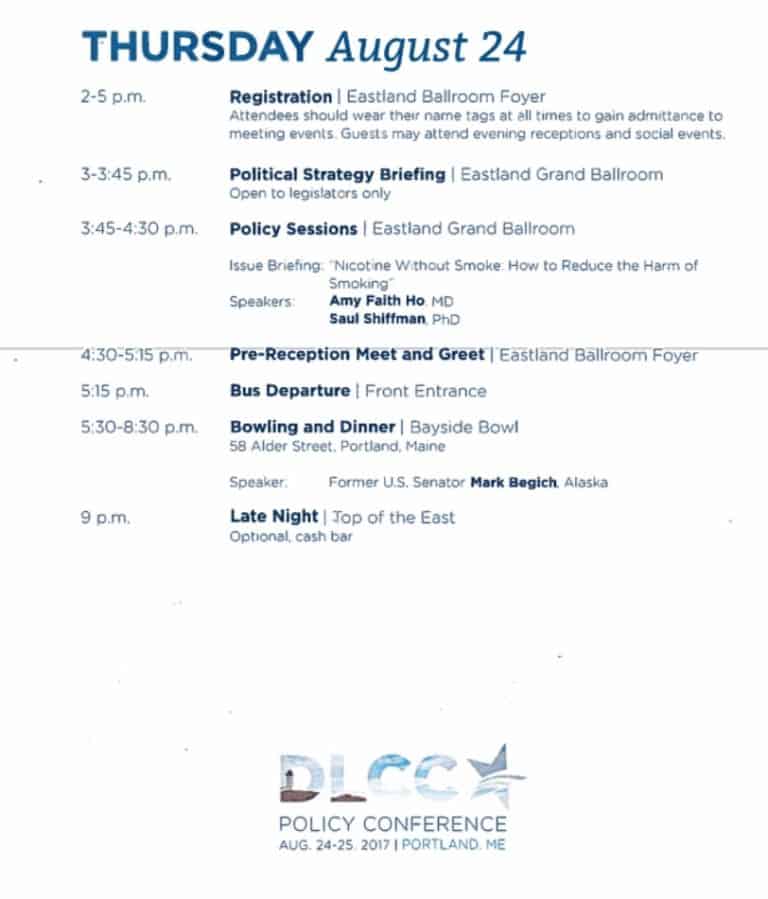The utility industry continues to pour money into the Republican party’s national political organizations. At the end of 2017, the Republican Governors Association had received nearly $1.8 million from utility companies while the Democratic Governors Association received less than half that amount. The $1.8 million in giving is the third-highest amount provided by the industry since 2008, according to an Energy and Policy Institute analysis. Similarly, the Republican Attorneys General Association and Republican State Leadership Committee each received considerably more money from the industry last year compared to their counterparts – the Democratic Attorneys General Association and Democratic Legislative Campaign Committee.
Some of the largest contributions to the six political organizations in 2017 came from investor-owned utilities with territories spanning several states or large ratepayer bases. NextEra led all utilities with a contribution total of $584,196 ($316,639 went to RGA). The industry’s trade association, the Edison Electric Institute, was also a big spender. It contributed $363,100 to the groups ($166,173 went to the RGA). Southern Company and Xcel Energy reached deep into their bank accounts as well to donate a total of $297,519 and $251,629, respectively (again, most went to RGA).

Two of the largest donations from utilities came from Dominion Energy and Public Service Enterprise Group (PSEG). The contributions from the Virginia and New Jersey-based utility companies are unsurprising since each state held elections for governor and attorney general in 2017. Dominion contributed $206,125 while PSEG contributed $327,500 to the groups. The groups then passed the money to candidates and local party organizations in Virginia and New Jersey.
The Wall Street Journal reported in December how RGA and DGA help corporations funnel donations to candidates in states with finance-rules – which includes New Jersey:
U.S. companies have found a loophole in state campaign-finance rules by funneling donations aimed at helping candidates through the RGA and its Democratic counterpart, according to multiple former officials. Donors can’t earmark money for a particular candidate. Instead, they can simply—and legally—tell the groups they have “an interest” in a race or are making a donation “at the request” of a gubernatorial candidate, these officials say … The RGA has a similar system, former RGA officials say.
RGA and DGA, along with RAGA, DAGA, RSLC, and DLCC are classified as political organizations created under Section 527 of the Internal Revenue Service code, meaning they can accept unlimited donations from corporations or individuals. The WSJ article highlighted how Florida law limited Florida Power & Light to a $3,000 contribution to Rick Scott’s 2014 re-election bid, but the utility contributed $300,000 and another $1.3 million to RGA, which then passed $1.5 million to a Republican political group to aid Scott’s election.
Privately Influence State and National Policy
Electing favored candidates is not the only reason that utility companies give to the various national political organizations.
Reports over the years have shown that these organizations host conferences and summits that allow donors to discuss and craft policies with elected officials and their staff behind closed doors.
For instance, RAGA hosted its host its annual Winter National Meeting on February 25-26, 2018. According to a 2018 membership document published by Documented, members that contribute $50,000 or $125,000 per year can lead private issue briefings with the Republican attorneys general. The $125,000 donors get the additional benefit of attending exclusive dinners and other events with attorneys general.
In February, The Intercept revealed that RAGA also has a file-sharing website called “The Briefing Room” used to share policy documents. Donors who give more than $25,000 a year have “posting access.”
Another recent example is the RGA “Corporate Policy Summit,” which occurred at the Trump National Doral Golf Resort in Florida in May 2017. One of the first agenda items was “Corporate Opening Plenary Session 1: Energy.” Attendees were able to discuss with the Republican governors and staff in attendance how “GOP-led states have continued to fight against overly burdensome, irresponsible regulations.” The description further states, “governors and the industry will discuss how they have adopted and responded to a volatile market and how they hope to work with the new Administration to ensure responsible, common-sense energy policy.”
Public Citizen recently filed a complaint with FERC over undisclosed contributions that grid operator PJM Interconnection, the regional transmission organization that coordinates the movement of wholesale electricity in all or parts of 13 states and the District of Columbia, has been making every year to both the RGA and DGA. Public Citizen notes that PJM has given a total of $456,000 to the Democratic and Republican governors’ associations since 2007.
PJM’s response adds further proof that if a donor pays thousands of dollars, they are then able to gain access and influence policy discussions. A spokesperson said that the payments to the governors’ associations were “annual business counsel membership fees that allow PJM to provide input and participate in policy summits on energy industry topics that could impact PJM’s members” (emphasis added). The $25,000 PJM gives to both RGA and DGA is more in annual giving than utilities themselves. In fact, in 2017, PJM’s $25,000 contribution to RGA was more than or equal to AES Corporation, Ameren, Black Hills Corporation, Entergy, Oncor, PG&E, PNM, Salt River Project, Tampa Electric, and Unisource. The grid operator’s $25,000 contribution to DGA was also more than or equal to AES Corporation, Cleco, Duke Energy, Dynegy, Entergy, FirstEnergy, NRG Energy, PG&E, and Puget Sound Energy.
PJM is currently working on a plan to change the way prices are set in the wholesale market that would benefit some of its stakeholders, notably Exelon, which was criticized by PJM’s Independent Market Monitor in October. According to RTO Insider, the Monitor suggested that PJM is following the talking points of Exelon, which is PJM’s largest participant.
Relationship Building and Funding Corporate Agendas
Another reason that the utility industry gives to the organizations is to build relationships with elected officials and their staff while wining and dining at resorts and to show appreciation for particular agendas elected officials enacted.
The Energy & Policy Institute previously revealed how several Republican attorneys general spoke candidly with donors at a 2016 fundraiser. West Virginia Attorney General Patrick Morrisey told the donors,
“As many of you know over the last year, year-and-a-half, we’ve really been focusing a great deal on a lot of the EPA litigations … Now I will tell you, I really am grateful for your help and I’m appreciative of it going, because while things have gone well, as you know, we helped lead the charge against the president’s Power Plan, obtaining the stay.”
At one RAGA meeting last year revealed by The Intercept, the organizations arranged a golf outing and a museum tour to connect attorneys general with donors who give the association at least $125,000 annually.
The Huffington Post recently highlighted how the DLCC hosted a conference in Portland; members who paid $35,000 or more were able to have one-on-one meetings with state legislators slated for 90 minutes. In addition to being able to privately meet with officials, donors were also able to attend policy briefings and then participate in evening events such as happy-hours, bowling, and dinner.
At the time of publication, the DLCC’s final 2017 list of donors was not yet uploaded to the IRS website and the organization did not respond to EPI’s inquiry regarding the final numbers. However, contributions in the first-half of 2017 reveal that utility contributions came from NextEra, Xcel, and EEI – each of $25,000. Individual $250 donations also came from lobbyists from these utilities, specifically NextEra’s David Applebaum, Xcel’s Wes Parham, and EEI’s Todd Wynn – now employed in the Department of Interior.
Utility Contributions From 2008 – 2017
As mentioned earlier, the utilities’ contributions to RGA in 2017 were the third-highest amount provided by the industry since 2008. The Energy & Policy Institute analyzed the filings by the six Section 527 political organizations and found over 70 utility holding companies and subsidiaries contributing to the groups for a total of $36.4 million from 2008 through 2017.
RGA was by far the largest recipient of the industry’s money. It has received $18.6 million from utilities over the past ten years. Notable contributions over the years have come from Duke Energy, which gave over $3 million in 2014; NextEra and its subsidiary FPL, which donated a total of $1.9 million in 2014; FirstEnergy, which contributed $450,000 in 2010.
Prior to 2014, RAGA operated within RSLC; yet state attorney general races was the main focus for the group. According to a 2014 Center for Public Integrity analysis, RSLC had contributed more than $16.6 million to attorney general campaigns during the past decade, more than any other group. The analysis shows that RSLC has enjoyed steady support from utilities over the years, particularly Duke Energy, which had contributed $410,000 from 2008 to 2014.
But in 2014, RAGA split from RSLC and began to fundraise on its own. Besides Koch Industries, Devon Energy, and the NRA, some of the earliest contributions came from utilities. DTE Energy, EEI, and Energy Future Holdings all had contributed thousands to RAGA in the first quarter of 2014. But one of the largest contributions that year came from Arizona Public Service’s parent company, Pinnacle West. It had contributed a total of $425,000. In just four years of fundraising as a separate organization, RAGA has received nearly double the amount of cash from utilities than DAGA has since 2008.
As for the Democratic state groups, DLCC gets the bulk of its utility donations from EEI, Energy Future Holdings, MidAmerican, NextEra, and Xcel; whereas Dominion, EEI, and NextEra, are the three largest total contributors to DAGA.
- Top 5 Utility Contributions to Republican IRS 527 Political Organizations, 2008-2017:
- NextEra Energy/Florida Power & Light ($5,482,429)
- Duke Energy/Progress Energy ($4,617,150)
- Southern Company and subsidiaries ($1,833,077)
- FirstEnergy/Allegheny Energy ($1,545,000)
- Edison Electric Institute ($1,083,470)
- Top 5 Utility Contributions to Democratic IRS 527 Political Organizations, 2008-2017:
- Duke Energy/Progress Energy ($1,906,250)
- Southern Company and subsidiaries ($1,254,400)
- Exelon and subsidiaries ($1,228,700)
- NextEra Energy/Florida Power & Light ($1,095,450)
- FirstEnergy/Allegheny Energy ($1,058,562)




